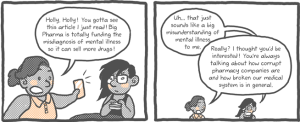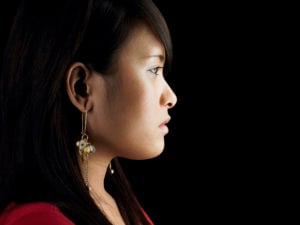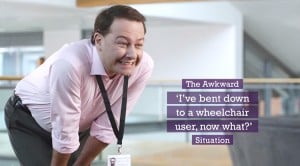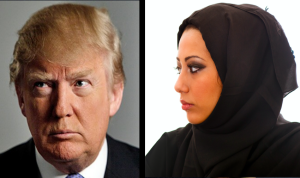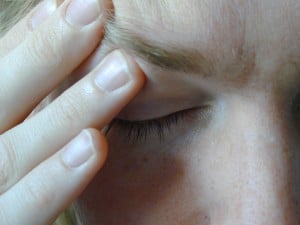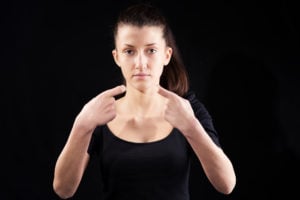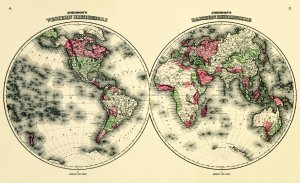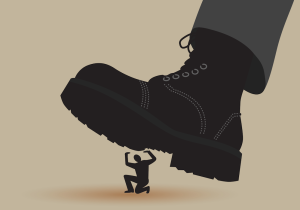Originally published on xoJane and republished here with permission.

Young adult looking at camera and keeping arms crossed while standing against grey background.
First things first: I, Poppa, freaks all the honeys…
Wait, no. Pardon the Biggie moment. It was important for me to begin this with a solid “first things first,” and I can’t not finish that statement that way. My apologies. Let’s begin again.
First things first: I am not the decider of the #BodyPositive movement. I don’t get to say anything about how you – or anyone but myself – feels about their body.
I do, however, want everyone, myself included, to feel great about themselves and the bodies we’re in, and I want to address some folks who I think are getting in the way of that necessary endeavor.
Every few months or so, I see people with traditionally attractive and conventionally acceptable slender bodies moaning and whining about being “left out” or “erased” from organized pushes toward body positivity, like the social media use of #BodyPositive and #BodyPosi. I never use those hashtags myself, and I cannot bear the hullabaloo from that group. Yet, I have previously remained silent.
At first, I shrugged them off as a misguided fringe group, and chose instead to celebrate those people sharing images of their beautiful bodies and sexy selves in all shapes and sizes. I didn’t want to take an authoritative tone in an arena that ultimately never elected me their spokesperson.
Images of my body are read as conforming to the societal “norms” that I am just as interested in breaking down as anyone else with good sense, but because of that privilege (yup, I’m dropping the P-word already), when I speak about the face that you can’t know someone’s health status based on their weight, or declare passionately that beauty comes in all sizes, the message is often muddled based on other people’s impressions of my appearance.
However, this conflict just keeps happening in my social media spheres. Over and over, I see thin people claiming discrimination (!) or feeling “bashed” (?!) in these spaces, and I just want to scream. So this is my attempt to speak, rather than scream.
I am a person who has survived serious eating disorders and still has to manage certain destructive behaviors around eating and exercise at times of extreme emotional distress. I’ve come a looong way with regard to feeling good about what I see when I look in a mirror, and I’m still on that journey.
If the #BodyPosi tags were literally only about feeling positive about your body, then technically I could jump on board without a second thought.
But once again, I am preaching the Gospel of Almighty Context. The swiftest of Google searches – or even a quick perusal of the pictures people are sharing of beauty in sizes larger than the majority of selfies out there (or otherwise not conforming to the same cookie-cutter mishigas of the “beach body” and straight-size modeling) – ought to tip folks off that this is a safe and celebratory space that is needed for the community it showcases, of which I am not a part.
When I see people showcasing their natural beauty with the “body positive” label, beauty that is not the kind we usually see in media and advertising, I personally find it jarring to have my appreciation interrupted by someone whose picture looks like an actual Victoria’s Secret ad using the tag.
I find myself thinking, “Go away! We’ve been seeing bodies like yours all the time since the dawn of forever!” Of course, that “go away” doesn’t mean “please never ever post pictures of yourself just because you would blend in with the cast of The Hills.” It just means maybe use a different hashtag, or none at all?
I don’t know of anyone from any marginalized community who thinks that centering the voices of those who have not historically been given the spotlight also means completely eradicating those who have. I’m free to post any and all images of myself that I want. So are you.
I’ve even tried to post more body pics and selfies, in an effort to join the larger movement of celebrating ourselves through showing ourselves, a concept that I’ve been transparent about struggling to grasp even as I envy the ease with which others practice it.
I’ll just refrain from using hashtags devoted to body positivity (let alone fat acceptance, as the difference between the two is better explained elsewhere), or anywhere I might take up space that others have specifically carved for themselves.
I’ve weighed twice my size, but people don’t see decades of struggle in one Instagram pic. Nor am I asking them to try, by placing myself in the context of a social movement that intentionally corrals images of bigger beautiful bodies, or bodies that are beautiful and disabled, or even larger bodies that don’t have a flat, toned stomach and hourglass figure, who seem left out of even many “plus” campaigns.
And while I do speak out about my personal journey, those tags are not the place to jump in and ask people to pay attention to my very long history that contradicts the picture you’re looking at right this minute. My issues with my body are very real, and not having a place within those hashtags neither “fixes” nor erases them.
I deal with them all I want in the privacy of my therapist’s office and with close friends and family, or through my writing or speaking engagements or any other way I please that doesn’t talk over others who deserve to be heard.
I feel particularly pained when I see Black people who would immediately shut down any “all lives matter” bullshit, but who somehow see no problem with thin, conventionally attractive bodies taking up space in these kinds of positive representation movements.
Of course all lives matter, just like we all deserve to feel positively about our bodies. But there is no need to assert or specifically rally around what society has not historically questioned, ignored, or destroyed.
My personal road toward physical acceptance might be bumpy, but I’m not aware of people with my measurements being paid less or denied employment because of appearance. I’m not aware of anyone of my size being publicly humiliated over it or receiving subpar and downright destructive “professional” medical treatment because they’re automatically deemed “unhealthy.” I can enter most stores and find my size.
#WellActually, I have a 37-inch inseam, so it’s difficult to buy pants off the rack. Poor me! In the context of people fighting to have any part of their body fully represented, in a world where talented actress Gabourey Sidibe has to make a public statement every other day because so many jackasses insult her for slaying on a red carpet or being in a fantastic sex scene on her TV show, I’m fairly certain I don’t need to organize a social media movement about my inseam issue.
Again, that doesn’t mean it’s not real – and I don’t get to decide how anyone’s pain feels to them, but I do get to decide to simply get my pants tailored and keep it pushing, and stay out of spaces that were not created for me, even if I feel I can claim them through some backdoor route, or on a technicality.
Here’s a tip: If you ever find yourself arguing something concerning someone’s humanity based on a technicality, rethink your position.
Some of you might hate me for even making this statement, which is your prerogative. Some people look at a current picture of me and simply don’t care about the history not captured in the frame, and if you hate this or me for that reason, thank you. You are proving my point about why I don’t use those hashtags.
Truly recognizing and checking one’s privilege is often best expressed by shutting the F up and going away, which is how I’ve generally (not) addressed this topic when I’ve seen it come up.
Part of checking my privilege is also knowing that I might get something wrong, or come across as dismissive and hurtful even with the best of intentions. True allyship that isn’t just entitled attention-seeking is difficult. And I might have still messed it up for some of you.
But I hope someone gets this message today and stops demanding inclusion in a movement that isn’t for you.
Claiming privilege is so difficult for some because it often flies in the face of their very real feelings – the man who feels professionally unsuccessful, the white person who is poor, and so on. Also, because it’s difficult to point to an absence of something as evidence, it’s hard to grasp that privilege is often manifested in what you don’t experience.
Sure, I could say something like “almost everyone has dealt with or is dealing with body insecurities,” which would be true. I could mention that way before social media or hashtags, many people who are naturally extremely thin – a group to which I’ve never belonged – have fought to have their need for body acceptance recognized as well. That would also be true. Which is why the current climate where so many personal experiences are welcomed and able to be shared is beautiful.
Join in or carve out your own safe space. Yes, all bodies are beautiful and all sizes matter. And if the ones who have specifically been told that they are not and they don’t are now stepping into the spotlight, just get out of the way.
I don’t even call myself “thin” (it’s just not a word I use), but I know enough to claim and check my thin privilege. Rachel Dolezal didn’t call herself white either, but when people are being denied their full humanity because of who they are and what they look like, I’m not the one to insist something is one way just because I say so in the face of overwhelming evidence to the contrary.
Hopefully we can get to a place where all bodies truly do matter, or maybe even move #BeyondBeauty, but we won’t get there without pointedly celebrating the ones that some assholes at some point decided should stay hidden. Until then, post what you want.
What I’m asking is that we pass the mic to bodies we haven’t heard from as much. Then we can all sing the chorus together.
[do_widget id=’text-101′]
Pia Glenn is an actress who also sings and dances and writes a bit, too. You might have seen her in You’re Welcome, America: A Final Night with George W. Bush (as Condoleezza Rice opposite Will Ferrell), The Frogs (as Virilla the Amazon opposite Nathan Lane), Kat and the Kings (as the leading lady Lucy Dixon opposite—aw, hell this is getting boring, I’ll just list them now), Monty Python’s Spamalot, Burn the Floor, Law & Order: SVU, Hannah Montana, Ally McBeal, Strong Medicine, Presidio Med, and a bunch of music videos back in the day. She enjoys classic films and the good kind of jazz. Tweet her at @piaglenn.

Search our 3000+ articles!
Read our articles about:
Our online racial justice training
Used by hundreds of universities, non-profits, and businesses.
Click to learn more





